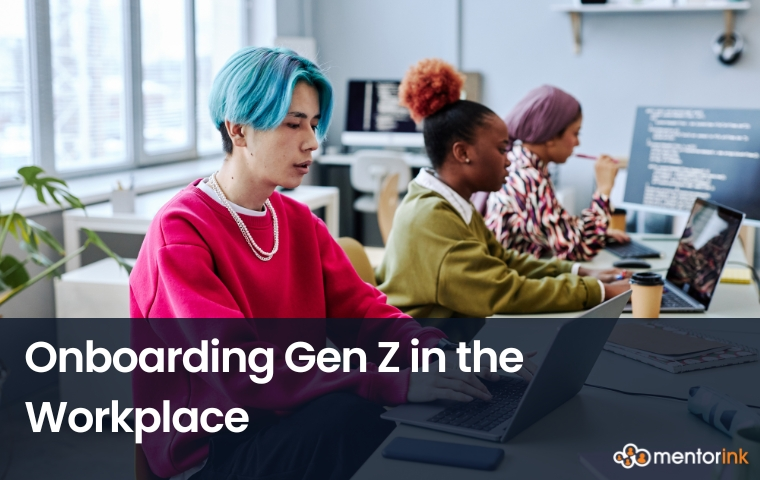
The workplace hosts different generations in those days. One of those generations seems unique: Gen Z. Born between the mid-1990s and early 2010s, these digital natives are independent, socially conscious, and driven by purpose. For them, having a job is not as important as feeling involved and having an influence right away. Onboarding Gen Z is therefore more important than ever. Gen Z makes snap judgments, so they will not be present if they do not feel appreciated, seen, or excited. Traditional onboarding is ineffective today because it involves a ton of paperwork, dull introductions, and ambiguous instructions. It is time to design a meaningful, captivating experience based on top priorities and expectations of Gen Z.
How Does Gen Z Affect the Workplace?
To truly understand how to onboard Gen Z, we first need to grasp the unique impact they’re already having on the workplace.
For starters, Gen Z places a high value on flexibility, transparency, and inclusivity. They grew up during rapid technological advances and global social movements, shaping them into employees who expect fairness, access to digital tools, and the ability to voice their ideas.
They seek purpose and alignment with their personal values in addition to moving up the corporate ladder.
Gen Z also craves learning and development. They want opportunities to grow, pick up new skills, and contribute in meaningful ways. Employers run the risk of disengagement and possibly rapid turnover if they don’t offer those pathways. That’s why corporations are reconsidering traditional hierarchies and adopting agile workflows, flatter structures, and hybrid models that give employees more freedom.
From the get-go, Gen Z’s presence has challenged outdated norms. They demand better work-life balance, advocate for mental health resources, and expect DEI (Diversity, Equity, and Inclusion) to be more than just a corporate buzzword.
In short, they are not afraid to ask, “Why are we doing things this way?” and that curiosity is driving much-needed change across industries.
Process Onboarding Gen Z?
Onboarding Gen Z effectively is less about orientation packets and more about crafting an immersive experience that reflects the culture and mission of the organization. The process should begin well before their first day and continue well into their first few months.
Making the First Day Count
The first day is everything for onboarding Gen Z. It sets the tone for what is to come for them. For Gen Z, it should feel welcoming, personal, and inspiring. It would be better to skip the cold handoffs and tech confusion. Instead, you can focus on real connections with them. Kick things off with friendly one-on-one introductions or small group conversations that feel natural.
Verify that all the necessary tools, login credentials, and support are available if they are remote or hybrid. Do not leave them guessing.
A clear and relaxed schedule with time to settle in, meet the team, and take breaks helps ease those first-day jitters. Simple touches like a handwritten welcome note, a company hoodie, or lunch with their manager show that their presence matters.
Promoting Digital Tools
Gen Z does not need help figuring out technology, but they do need the right access on tools. Onboarding Gen Z should include a hands-on tour of the tools they’ll be using, with a focus on how each one fits into the company’s way of working. Whether it can be Slack, Notion, Zoom, or Asana, they want to understand the bigger picture and how they contribute to it.
The tools should be easy to use and mobile-friendly. Gen Z also expects flexibility and quick access to information wherever they are.
Outdated systems or clunky platforms can be a major turnoff. Keep the tech stack clean and make the learning process feel natural and stress-free.
Goal Setting
Purpose matters deeply to Gen Z. They are not just here to clock in; they want to contribute meaningfully. That’s why goal setting should be part of onboarding. Within the first week, managers should work with new Gen Z hires to establish clear, attainable objectives. Professional goals should align with both team performance and personal growth.
Being transparent on goals can be helpful for them. Inform them of how their work fits into the larger objectives of the business. Upon realizing the impact of their work, they become more engaged. Weekly check-ins at first facilitate progress monitoring and enable prompt corrections. Feedback, both given and received, should be open and constructive. Gen Z sees feedback as a growth tool, not a criticism.
Building a Culture of DEI
Gen Z is looking for more than just talk when it comes to diversity, equity, and inclusion. They want to see real action in DEI. That means visible representation in leadership, inclusive policies that are actually practiced, and safe, supportive spaces where every identity is respected.
If DEI is truly part of your company’s values, it should be clear from the very beginning. Introduce employee resource groups, clearly explain anti-discrimination policies, and highlight how diverse voices are valued across the organization.
Representation in training, leadership presence, and even the makeup of onboarding groups sends a strong message.
To Gen Z, DEI is not just a trend. For them it is a crucial the foundation of a culture they want to be part of. When inclusion is authentic, they will notice. And when it is not, they will notice that too.
Mentorship That Matters
Mentorship can make all the difference when welcoming Gen Z. Instead of the traditional model of occasional check-ins with a senior leader, peer-to-peer mentorship seems more valuable for Gen Z. What this generation values is a real connection with someone who understands them and offers genuine day-to-day guidance.
Pairing new hires with a peer or near-peer mentor helps ease the transition and gives them a go-to person for questions and support. Mentors help explain the unspoken rules, clarify the culture, and offer insights beyond formal training.
Even casual moments like a coffee chat or a quick message can build trust and confidence. These relationships show Gen Z they are not alone and that someone truly wants to see them succeed. When they feel supported, they are far more likely to stay, grow, and thrive.


